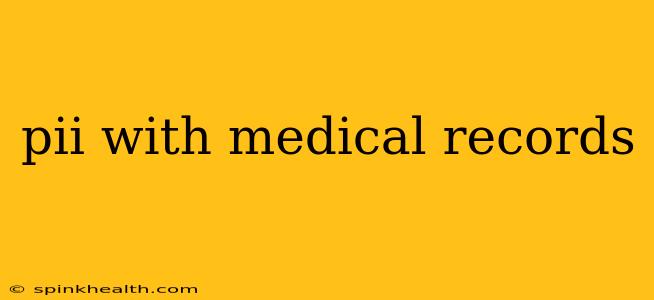Protecting Your Health: Navigating the Complexities of PII and Medical Records
The world of healthcare is increasingly digital. While this offers incredible convenience and access to better care, it also introduces significant concerns about privacy. At the heart of these concerns lies the intersection of Personally Identifiable Information (PII) and medical records. This isn't just a matter of ticking boxes on a form; it's about safeguarding incredibly sensitive data that paints a complete picture of your health, lifestyle, and even your family history.
Let's delve into this crucial topic, unpacking the complexities and empowering you to understand how your health information is handled and what you can do to protect it.
What is PII in the context of medical records?
PII in medical records encompasses any information that could potentially identify you. This goes far beyond your name and address. It includes:
- Direct identifiers: These are the obvious pieces of information: your name, address, phone number, email address, Social Security number, medical record number, date of birth, etc.
- Indirect identifiers: These are less obvious but equally revealing. Think about your employment history, your spouse's name, details about your children, specific medical conditions (rare diseases can be identifying), or even the location of your medical appointments. Combining seemingly innocuous pieces of information can lead to your identification.
Think of it like a puzzle. Each piece of information, on its own, might not reveal much. But put them together, and a clear image—you—emerges.
How is my PII used in healthcare?
Your PII is used for many vital purposes within the healthcare system. It's essential for:
- Billing and insurance claims: Your information is needed to process payments and ensure accurate billing.
- Coordinating care: Doctors and specialists need access to your records to provide the best possible care.
- Public health reporting: Aggregated and anonymized data helps track disease outbreaks and improve overall public health.
- Research: Medical research often requires access to patient data, but stringent regulations are in place to protect individual privacy.
The key is ensuring this use is secure, ethical, and compliant with regulations.
What are the risks associated with PII breaches in medical records?
A breach of your medical PII can have devastating consequences:
- Identity theft: Your Social Security number and other identifying details can be used for fraudulent purposes.
- Medical identity theft: Someone could use your information to obtain medical services or file false insurance claims.
- Financial loss: You could incur significant debt due to fraudulent medical bills.
- Emotional distress: The violation of your privacy can be incredibly distressing and affect your mental health.
- Reputational damage: The unauthorized release of sensitive medical information could have social and professional repercussions.
These aren't hypothetical scenarios; they are real threats that require proactive protection.
What regulations protect my PII in medical records?
Several robust regulations are designed to protect your medical PII. The most significant in the US is HIPAA (Health Insurance Portability and Accountability Act). HIPAA sets strict standards for the privacy, security, and confidentiality of protected health information (PHI). This includes both electronic and paper records. Other countries have their own data protection laws, often mirroring the principles of HIPAA.
Understanding the specifics of these regulations is important, but relying solely on compliance isn't enough. Personal vigilance plays a crucial role in safeguarding your information.
What can I do to protect my PII related to medical records?
You are not powerless in the face of these risks. Taking proactive steps can significantly reduce your vulnerability:
- Be selective about who you share your information with: Only provide PII to trusted healthcare providers and organizations.
- Review your medical records regularly: Check for any inaccuracies or unauthorized access.
- Be cautious about sharing information online: Avoid posting sensitive medical details on social media or other public platforms.
- Choose secure healthcare providers: Select providers with strong data security practices.
- Use strong passwords and enable two-factor authentication: This adds an extra layer of security to your online accounts.
- Report suspicious activity immediately: If you suspect a breach, contact your healthcare provider and the relevant authorities.
Protecting your PII in the context of medical records is a shared responsibility. Healthcare providers must adhere to strict regulations, but you, as the patient, also have a vital role to play in safeguarding your health information. By understanding the risks and taking proactive steps, you can significantly reduce the likelihood of a privacy breach and protect your well-being.

